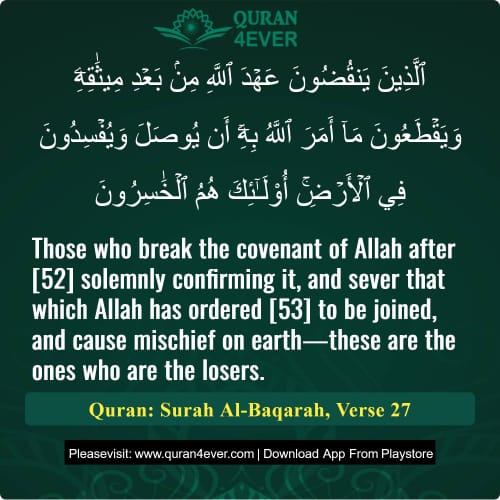
Transliteration:( Allazeena yanqudoona 'ahdal laahi mim ba'di meesaaqihee wa yaqta'oona maaa amaral laahu biheee ai yoosala wa yufsidoona fil ard; ulaaa'ika humul khaasiroon )
"Those who break the covenant of Allah after [52] solemnly confirming it, and sever that which Allah has ordered [53] to be joined, and cause mischief on earth—these are the ones who are the losers."
The “covenant” in this verse refers to the primordial pledge that Allah took from all souls—to believe in His Messengers, especially the final Prophet ﷺ.
At that pre-worldly stage, every soul affirmed belief, and so those who later refuse to accept the Prophet ﷺ have, in fact, broken that covenant. As a result, they are deprived of guidance from the Qur'an.
Two critical points emerge from this:
The Qur’an provides guidance to some and misguidance to others—but those in the company of the Holy Prophet ﷺ receive pure guidance only.
As Allah says:
“And undoubtedly, you most certainly guide to the Straight Path.” (Surah Ash-Shura, 42:52)
The Qur’an misguides only those who have severed their emotional and spiritual ties with the people of the Qur’an—i.e., the Holy Prophet ﷺ, his Companions, and the pious saints.
On the other hand, those who maintain love and obedience toward these blessed individuals receive complete guidance, as these noble souls themselves are a means of guidance.
This verse also teaches two important spiritual disciplines:
Allah commands us to connect with certain people and cut ties with others.
One must build loyalty with the Holy Prophet ﷺ and detach from disbelievers.
Being connected to the righteous servants of Allah is a source of dignity, honor, and success. Remaining distant from them leads only to humiliation and loss—both in this world and the Hereafter.
The tafsir of Surah Baqarah verse 27 by Ibn Kathir is unavailable here.
Please refer to Surah Baqarah ayat 26 which provides the complete commentary from verse 26 through 27.
(2:27) who break the covenant of Allah after its firm binding,[31] and cut asunder what Allah has commanded to be joined,[32] and spread mischief on earth.[33] They are the utter losers.
31. The injunctions or ordinances issued by a sovereign to his servants and subjects are termed ‘ahd in Arabic since compliance with them becomes obligatory for the latter. ‘Ahd has been used here in this sense. The ‘ahd referred to signifies God’s eternal command that all human beings are obliged to render their service, obedience and worship to Him alone. ‘After its binding’ refers to the promise made by mankind to remain faithful to the injunctions of God at the time of Adam’s creation. For details see (Surah Al-Isra, ayat 172)
32. That is, the transgressors strike their blows at those very relationships upon which the individual and collective well-being of mankind depends, and which God wants maintained on a sound basis. This small sentence is of great import as it embraces the whole of human morality and social life, and extends from relationships between individuals to those between nations. ‘To cut asunder what Allah has commanded should he joined’ does not merely signify the disruption of relationships between man and man; it forbids the establishment of all forms of human relationship except the right and permissible ones. For wrong and prohibited bonds between people have the same consequences as the disruption of the bonds of human relationship as such
33. In these three sentences the nature of transgression and the attitude of transgressors is fully defined. To debase the relationship between man and God, and between man and man necessarily leads to ‘mischief’. Those who spread this ‘mischief’ on earth are transgressors.

For a faster and smoother experience,
install our mobile app now.
Related Ayat(Verses)/Topics